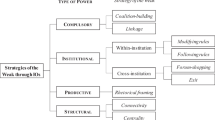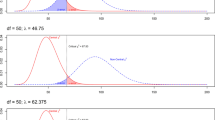Abstract
Sen's capabilities are reducible to individual power. Morriss's important distinction between ability and ableness is pertinent to the correct analysis of measuring capabilities. Morriss argues reducing power to resources constitutes the vehicle fallacy. The vehicle fallacy is not a fallacy if resources are measured relationally, for example, the power of money is relative to its distribution. It follows that strategic considerations must enter into the very essence of the concept of power. While ‘resources’ in this essay are broader than Dworkin's account, the argument suggests that Sen's capabilities account of egalitarian justice is not so distinct from Dworkin's resource account after all.
Similar content being viewed by others
Notes
A version of this paper was first presented at the PSA conference in Leicester 2003. I thank the participants, particularly Patrick Dunleavy and Peter Morriss for their comments. I also thank Matthew Braham, and an anonymous referee for comments and especially Martin van Hees for many discussions of related issues over the years.
Brighouse and Fleurbaey, MS is the closest counterexample I can think of, but is not really about this topic.
All references are made to the second (2002) edition of Morriss's book first published in 1987. The second edition is identical apart from minor typographical changes and a new long Introduction.
I would say it is a ‘naturally necessary’ feature of alcohol. Alcohol was developed and drunk because it helped destroy germs. It also has the pleasant effects of intoxication. Thus, whisky and its alcohol content are not simply contingent features of our social world. They were developed for a purpose and they fulfilled a function, and thus their presence and why we drink whisky are not entirely contingent. How people react to its effects is also not contingent. People whose heritage is European are less prone to the effects of alcohol than those from the east or Americas since those in the east and the Americas used other techniques to free their drinking water from germs — largely through heating and using herbs (see e.g., Diamond, 1998).
Alcoholics on the other had may be strongly affected by the first drink, as the alcohol immediately sets their brain on its ‘alcohol-directed path’.
This and the next two paragraphs are taken from Dowding (2003).
Although what we recognize as a ‘cause’ depends upon what causal question we are asking. And so what we define as ‘cause’ and what as ‘background conditions’ does attach to the meaning of the words by which we describe those events.
Such as qualia.
See Dowding (2006) for a related argument about capabilities, and Dowding (2008c) for an extension of the strategic problems over what to equalize for luck egalitarianism.
Braham and Holler (2005) argue that the concept of power is contained with the game form though it is exercised through the game. This is a subtly different account from Morriss's. Here the game form will specify the power of the player given how the game will be played once preferences are assigned. (A game form is the rules of a game without the assignation of preferences). But how the preferences are assigned is, in my terms, luck, since that will specify which coalitions are likely to form. An agent's power is then partly a matter of luck, and partly a matter of the game form. We can identify resources with the rules of the game (the game form).
Studies of voting patterns on supreme courts in US States have shown that where the votes are taken in order of seniority, decisions go with the first voters more often than those where votes are taken in reverse seniority or random order.
Dowding and van Hees (2007) consider the strategic inter-relationship between preferences and the concept of freedom.
It is not an ad hoc device used to ‘save’ any purported explanation. Rather luck — especially in its systematic form — is analysable in terms of the convergence or divergence of actors’ preferences. And, I think, other structural features of society can help explain such convergence or divergences. I show in Dowding (2008c) that if outcomes are equalized (by whatever that equalization is measured) luck disappears.
See Dowding and van Hees (2003) for more on the importance of type and token in the measurement of rights and freedoms, in relationship to different measures of welfare in Dowding (2008d) and in the social sciences more generally in Dowding (2008e).
Of course, in the sugar example, empirical demonstration may well be easier than theoretical demonstration! But this is not so for all cases in the sciences or social sciences.
To begin with this just seems like a mistake. As Morris recognizes dispositions need to be defined in terms of the conditions under which they hold. An object is still fragile under the conditions in which it easily breaks. We consider fragility of ordinary objects under the temperatures in which we handle them. But scientifically fragility would be defined relative to temperature.
If the divine agent only sometimes intervenes then we either analyse the conditions under which He does — perhaps it always happens on wet Tuesdays — or recognize the intervention is random under some probability distribution.
This is what we are interested in when considering the power structure. In mainstream political science, ‘power’ as a concept has almost disappeared as much is concerned with explaining specific outcomes rather than the relative outcomes (Dowding, 2008b), though as the literature on the power of different institutions of the EU demonstrates, power does re-enter when those relative comparisons are made.
Sen denies that he has a ‘theory of justice’ and would, I think, say this aphoristic representation of his argument is simplistic; nevertheless the upshot of his considerations seems to me to boil down to this claim.
References
Barry, B. (2002) ‘Capitalists rule OK? Some puzzles about power’, Philosophy, Politics and Economics 1 (2): 155–184.
Benton, T. (1988) ‘Review of Peter Morris Power’, Sociology 22: 491–493.
Braham, M. and Holler, M. (2005) ‘The impossibility of a preference-based power index’, Journal of Theoretical Politics 17 (1): 137–157.
Brighouse, H. and Fleurbaey, M. (MS) ‘On the fair allocation of power’, http://philosophy.wisc.edu/brighouse/PapersonWeb.htm.
Dennett, D. (1984) Elbow Room: The Varieties of Free Will Worth Wanting, Cambridge, MA: Bradford Books.
Diamond, J. (1998) Guns, Germs and Steel: A Short History of Everybody for the Last 13,000 Years, London: Vintage.
Dowding, K. (1991) Rational Choice and Political Power, Aldershot: Edward Elgar.
Dowding, K. (1994) ‘The compatibility of behaviouralism, rational choice and the “new institutionalism”’, Journal of Theoretical Politics 6 (1): 105–117.
Dowding, K. (1996) Power, Buckingham: Open University Press.
Dowding, K. (2001) ‘There must be end to confusion: policy networks, intellectual fatigue, and the need for political science methods courses in British universities’, Political Studies 49 (1): 89–105.
Dowding, K. (2003) ‘Resources, power and systematic luck: a response to Barry’, Philosophy, Politics and Economics 2 (3): 305–322.
Dowding, K. (2006) ‘Can “capabilities” reconcile freedom and equality?’, Journal of Political Philosophy 14 (3): 323–336.
Dowding, K. (2008a) ‘Agency and structure: interpreting power relationships’, Journal of Power Studies 1 (1): 21–36.
Dowding, K. (2008b) ‘Rational Choice Perspectives’, in S. Clegg, M. Haugaard and C. Lester (eds.) Handbook of Power, London: Sage.
Dowding, K. (2008c) ‘Luck and responsibility’, Critical Review of Social and Political Philosophy, forthcoming.
Dowding, K. (2008d) ‘What is Welfare and How might it be Measured?’, in D. Ross and H. Kincaid (eds.) Oxford Handbook of the Philosophy of Economics, Oxford: Oxford University Press.
Dowding, K. (2008e) ‘“Defensa de la Preferencia Revelada” (“In defence of revealed preference theory” trans. Fernando Aguiar)’, Revista Internacional de Sociología LXVI 49 (Enero-Abril): 9–31.
Dowding, K., Dunleavy, P., King, D. and Margetts, H. (1995) ‘Rational choice and community power structures’, Political Studies 42 (3): 265–277.
Dowding, K. and Hindmoor, A. (1997) ‘The usual suspects: rational choice, socialism and political theory’, New Political Economy 2 (3): 451–463.
Dowding, K. and van Hees, M. (2003) ‘The construction of rights’, American Political Science Review 97 (2): 281–293.
Dowding, K. and van Hees, M. (2007) ‘Counterfactual success and negative freedom’, Economics and Philosophy 23: 141–162.
Dworkin, R. (2002) Sovereign Virtue: The Theory and Practice of Equality, Cambridge, MA: Harvard University Press.
Harsanyi, J.C. (1969a) ‘Measurement of Social Power, Opportunity Costs, and the Theory of Two-person Bargaining Games’, in R. Bell, D.V. Edwards and R.J. Wagner (eds.) Political Power: A Reader, London: Collier-Macmillan.
Harsanyi, J.C. (1969b) ‘The Measurement of Social Power in n-person Reciprocal Power Situations’, in R. Bell, D.V. Edwards and R.J. Wagner (eds.) Political Power: A Reader, London: Collier-Macmillan.
Holtz, A. (1997) ‘Study: young brains especially susceptible to alcohol’, CNN Interactive Health, http//www.cnn.com/HEALTH/9701/09/nfm/youth.alcohol/index.html, accessed 4 March 2003.
Kenny, A. (1975) Will, Freedom and Power, Oxford: Blackwell.
Martin, C.B. (1994) ‘Dispositions and conditionals’, Philosophical Quarterly 44: 1–8.
Morriss, P. (1987) Power: A Philosophical Analysis, 1st edn., Manchester: Manchester University Press.
Morriss, P. (2002) Power: A Philosophical Analysis, 2nd edn., Manchester: Manchester University Press.
NIAAA (1992) ‘The genetics of alcoholism, national institute on alcohol abuse and alcoholism’, No. 18. PH 357, July: http://www.niaaa.nih.gov/publications/aa09-text.htm, accessed 4 March 2003.
NIAAA (2000a) ‘Why do some people drink too much? Role of genetic and psychological influences, 10th special report to the United States Congress on alcohol and health’, 24(1): http://www.niaaa.nih.gov, accessed 4 March 2003.
NIAAA (2000b) ‘From genes to geography: the cutting edge of alcohol research’, National Institute on Alcohol Abuse and Alcoholism, no 48, July: http://www.niaaa.nih.gov/publications/aa09-text.htm, accessed 4 March 2003.
Sen, A. (1987) ‘The Standard of Living: Lecture II: Lives and Capabilities’, in A. Sen (ed.) The Standard of Living, Cambridge: Cambridge University Press, pp. 20–38.
Sen, A. (1993) ‘Capability and Well-being’, in M.C. Nussbaum and A. Sen (eds.) The Quality of Life, Oxford: Oxford University Press, pp. 30–53.
Author information
Authors and Affiliations
Rights and permissions
About this article
Cite this article
Dowding, K. Power, Capability and Ableness: The Fallacy of the Vehicle Fallacy. Contemp Polit Theory 7, 238–258 (2008). https://doi.org/10.1057/cpt.2008.23
Revised:
Accepted:
Published:
Issue Date:
DOI: https://doi.org/10.1057/cpt.2008.23




